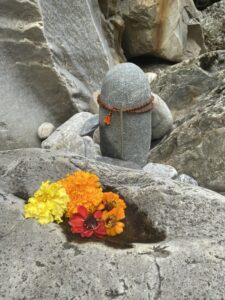There once was a prince who, being the son of a wise and powerful king, was also wise and powerful. One fine day he went to the river to take his morning bath. He felt so good that he decided to swim clear across to the other shore. He took off his royal robes and plunged into the refreshing waters. In a few minutes he was climbing out on the bank of the other side, feeling wonderful. Then, suddenly, he slipped on a rock and fell hard, banging his head. He lay unconscious for some time and when awoke he had amnesia. He could not remember who he was or where he was. He stood naked and alone, confused to the core of his being.
The prince found an old cloak along the river, so he dressed himself and walked to the nearest town. By his clothing, the people took him to be a common laborer. A local farmer took him on as a hired hand. As time went on, the prince became accustomed to life with the people in the town. The farmer adopted him as a son, so he had a name. He married a local girl and had children with her, so he had a family. And he learned the trade of farming, so he had an occupation. As such, he knew who he was, where he was, and what he should be doing.
Years later, one of the King’s ministers was traveling when he came upon the prince, now living as a farmer. He told the prince about his true identity and his real name, but the “farmer” refused to accept what he was hearing. He found it impossible to believe that he was, in actuality, from a royal lineage, heir to a throne. The minister’s description of the wealth and power available to him sounded like some grand fable. As he was very busy with his chores, he found it necessary to send away this foolish man who prattled on about his being a prince.
The most frequently asked theological question may well be: From where does suffering arise? Many spiritual traditions postulate reasons based on their metaphysical premises. Thus comes the enormous variety of theories: misery comes from a fallen world, evil is from the devil, pain is God’s test, and other variations on the theme that an external agent is behind one’s suffering. The profound yogic tradition, however, does not attribute suffering to any external cause. Yoga philosophy holds that the cause of suffering is due to the unhealthy use of one’s own mind.
If the great yogis are right and suffering is due to the unhealthy use of our minds, it then follows that we can reduce suffering by bringing our minds to good health. We do this, first and foremost, by taking responsibility for our own consciousness. We do not blame others, nor circumstances, for the suffering we experience. Honestly and truthfully we must search our hearts and recognize that the harvest we reap has indeed sprung from the seeds we have sown. If we imagine it has come from anywhere else, we are simply avoiding responsibility. In this way, we can release the habit of blame and actually change our consciousness.
The process of changing one’s consciousness is undertaken with the help of the great inquiry, the atma-vichara, “Who am I?” By searching deeply inside for the answer, we discover that all our social roles are temporary identities we have adopted. The forgetful prince came to believe he was simply a son, a husband, a farmer. In a sense he was all these but, if he truly knew himself, he would understand that he was also very much more. To become a prince and enjoy the privileges that were his, he did not need to accomplish or gain anything, he needed only to remember his true identity.
All of us suffer from a cosmic amnesia, which in yoga is called avidya, “lack of wisdom.” We have forgotten the royal source from which we were created, instead believing we are our bodies. Our suffering does not so much arise from these bodies, but the self-images they tend to generate; images that distort our true magnificence. Our work is not to denigrate our bodies, our work is to elevate the bodily aspects of life so they become sacred.
Until the prince remembers he is the son of a king, he will not have access to the resources that his father can provide. He will have to struggle through mundane life like a mundane personality. Until we awaken to the divinity that lays within us, we will not have access to the energy, the peace, and the love that belong to us. We will have to struggle and weep over the affairs of the world, from which we all, in our own ways, suffer. Like the prince, we need not achieve or attain anything in order to claim our riches, we need only realize the spiritual answer to the inquiry, “Who am I?”
The great sages of every spiritual tradition have come to us with one great, universal message: awaken and know your real Self. The pangs of suffering we experience in our daily lives are reflections of the deep, primal pain resulting from the belief that we are separate from God. In one of the gnostic gospels, Jesus descends into hell in order to free the inmates there. Yet no one would leave with him. It was not because they doubted he was their savior, but because they refused to acknowledge they were in hell. Let us acknowledge that our unenlightened condition is hell, and that we want out.
The sun of spiritual practice evaporates the clouds of avidya. The sticky entanglements of the complex world wash away and we stand pure and free. The burden of false self-images falls from our shoulders and we access the peace and power which had lain dormant in our hearts. The darkness of confusion and suffering disappear before the light of spiritual intelligence. We awaken and we know who we are, where we are, and what we are doing.
Life becomes more direct, simple, real. We find ourselves becoming increasingly peaceful, healthy, happy and harmonious, without any kind of big fuss. Our work is not yet over, but our minds are not so distracted by superficial worries. We lessen our petty attachments and selfish desires, enabling us to live in the world in a dutiful but carefree manner. The prince attains his birthright and comes to live in a palace of spiritual consciousness. Seated on a throne built of the gold of devotion, he presides over a kingdom of love. Thus is true royalty.




